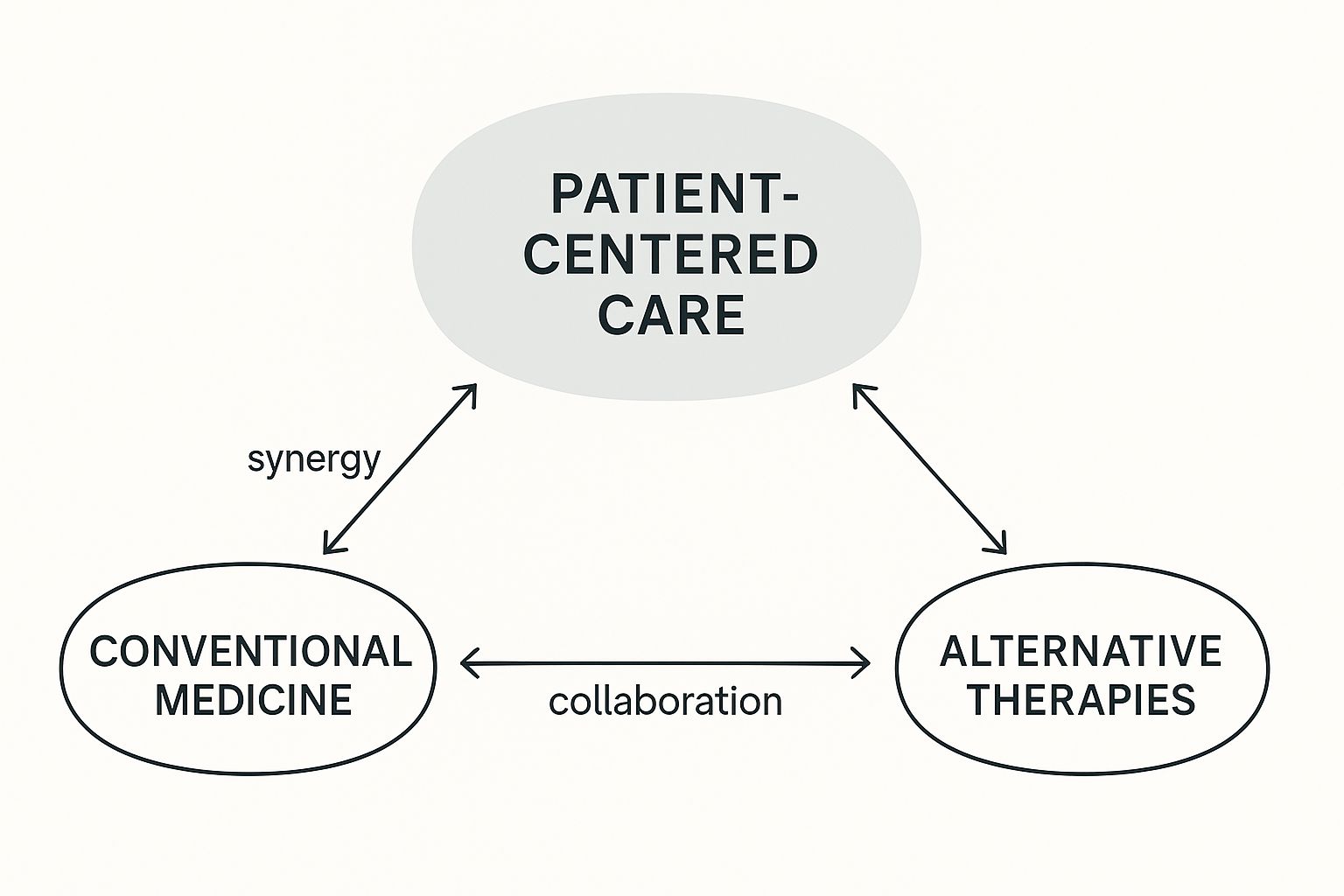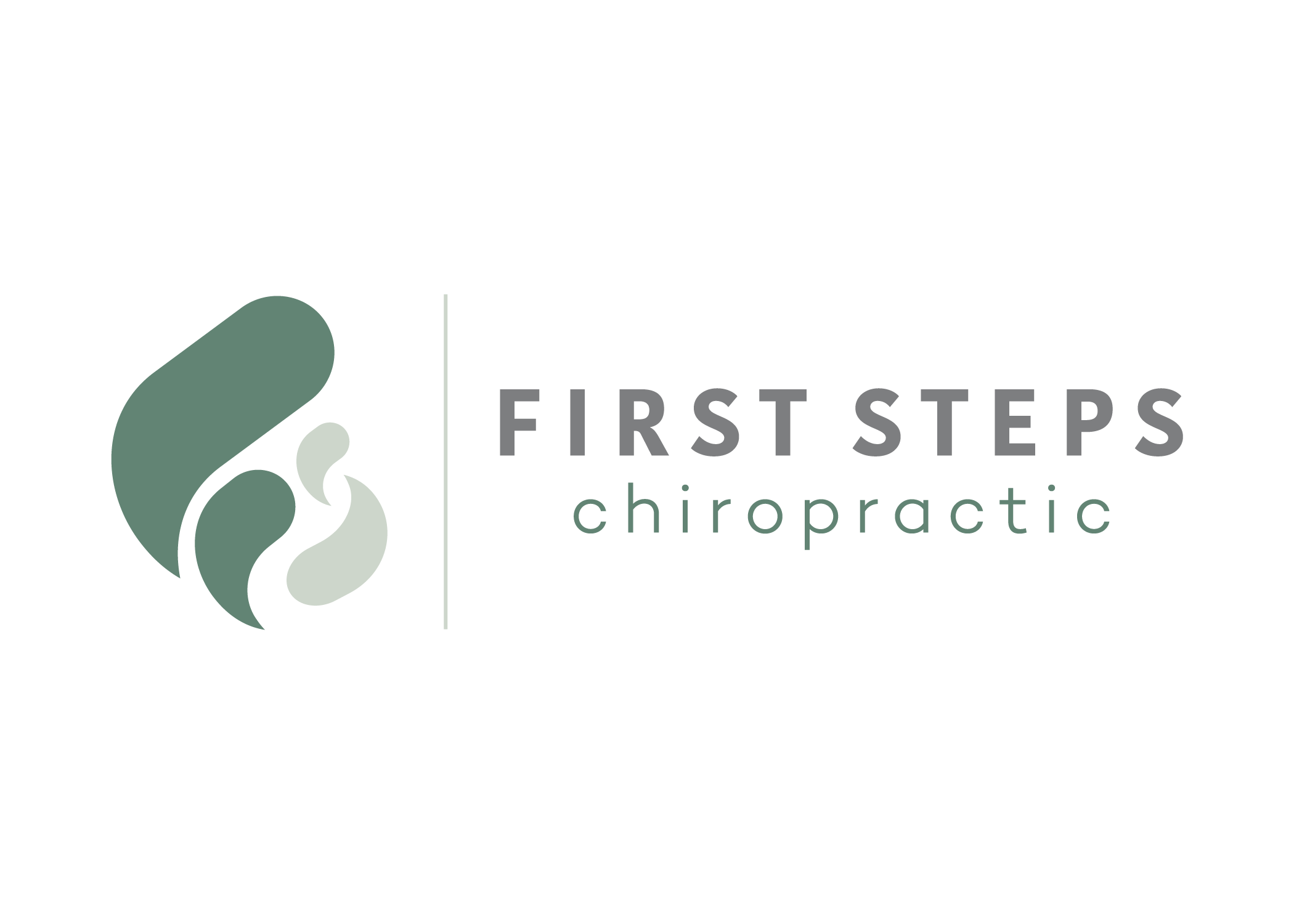Picture this: your doctor, your chiropractor, and your nutritionist are all on the same page, working from a single playbook designed just for you. That’s the real magic behind integrative healthcare solutions. It’s a way of thinking about health that goes way beyond just chasing symptoms to build genuine, lasting wellness. We combine the best of what conventional medicine has to offer with proven, evidence-based practices to get to the root cause of what's going on.
Understanding the New Blueprint for Wellness
Integrative healthcare isn't about picking sides between conventional medicine and alternative therapies; it's about choosing the best of both worlds.
Think of it like being a skilled gardener. You wouldn’t just pull the weeds (the symptoms) and call it a day, right? Of course not. You'd also enrich the soil, make sure there’s enough sunlight, and provide the right nutrients (addressing the root causes) to help the entire plant thrive. This approach creates a partnership between you and your healthcare providers, placing you right at the heart of your own care plan.
The whole point is to look at the complete picture—mind, body, and spirit—to see how every part of your life influences your health. This is a huge shift from the old model, which often treats symptoms in isolation without ever asking why they appeared in the first place.
A Patient-Centered Philosophy
At its core, this approach is deeply personal. Forget one-size-fits-all prescriptions. Instead, you get a care plan built around your unique lifestyle, genetics, and environment.
This might look like:
- Combining Therapies: Using gentle chiropractic adjustments to improve how your nervous system functions while also following your medical doctor's advice. You can learn more about how we support this in our article on addressing nervous system dysregulation.
- Focusing on Prevention: Putting a real emphasis on nutrition, stress management, and simple lifestyle changes to head off illness before it even starts.
- Empowering You: Giving you the knowledge and tools you need to take an active role in your own health journey, rather than just being a passive recipient of treatment.
This isn't about separate, siloed treatments. It's about synergy.

As you can see, conventional medicine, alternative therapies, and a patient-centered focus aren't competing—they're working together to create a stronger, more effective model of care.
This shift towards a whole-person model is more than a trend; it represents a fundamental change in how we view and manage health. It acknowledges that true wellness comes from addressing interconnected systems, not just isolated problems.
The growing demand for this kind of care is impossible to ignore. The global integrative health market was valued at around USD 80 billion in 2023 and is on track to nearly double by 2032. That kind of growth sends a clear message: people want healthcare that is more personal, more preventative, and simply more effective.
Integrative Healthcare vs Conventional Medicine At a Glance
So, what are the key differences between the two models? This table breaks it down.
| Aspect | Conventional Healthcare Model | Integrative Healthcare Model |
|---|---|---|
| Primary Focus | Treating specific symptoms and diseases | Addressing root causes and promoting overall wellness |
| Approach | Often isolates the affected part of the body | Views the body as an interconnected system (mind, body, spirit) |
| Patient's Role | Typically a passive recipient of care | An active, empowered partner in the healing process |
| Treatment Tools | Primarily pharmaceuticals and surgery | Combines conventional methods with therapies like chiropractic, nutrition, and stress management |
| Goal | Symptom management and disease cure | Prevention, long-term health, and optimal vitality |
While conventional medicine is incredibly powerful for acute issues and emergencies, the integrative model provides a much broader toolkit for building and maintaining health for the long haul.
The Pillars of a Modern Integrative Practice
An effective integrative approach isn't just a random mix of therapies; it's a carefully coordinated system of care where every part works in synergy. Think of it like a high-performance pit crew for your body. Each member has a highly specialized role, but they all work in perfect sync to achieve one goal: peak performance. True integrative healthcare solutions are built on distinct pillars that support one another to restore health from the ground up.
These pillars aren't isolated treatments. Instead, they are interconnected pieces of a single, unified strategy. When we address the body’s structure, nervous system, and nutritional needs all at once, we create a powerful environment for genuine healing. This is where lasting wellness truly begins.

Chiropractic Care as the Foundation
At the heart of our practice is chiropractic care, which serves as the structural and neurological foundation for health. It’s a common misconception that chiropractic is just for back pain. While it’s incredibly effective for pain, its primary goal is much deeper: to optimize the function of the entire nervous system.
Your spine is the protective housing for your spinal cord—the main superhighway of communication between your brain and every other part of your body. When vertebrae get misaligned (a condition we call subluxation), they can interfere with this critical communication, a bit like static on a phone line. This interference can lead to a huge range of health issues that go far beyond simple aches and pains.
Gentle, precise adjustments help restore proper alignment, removing that interference and allowing the body's innate intelligence to function without disruption. This simple act improves nerve signaling, which in turn enhances the performance of every organ, tissue, and cell in your body.
Neuro-Tonal Techniques for Stress Regulation
In our fast-paced world, many of us are stuck in a constant state of "fight or flight," with our nervous systems locked in high gear. This chronic stress state, known as sympathetic dominance, can lead to anxiety, poor sleep, digestive issues, and a weakened immune system. Neuro-tonal techniques are specifically designed to hit the reset button on this imbalance.
These gentle, non-invasive methods focus on the tone, or tension, held within the nervous system. Instead of forceful manipulations, techniques like the Torque Release Technique (TRT) use precise and light adjustments to release stored tension. The goal is to help the nervous system shift back into a state of rest and healing (parasympathetic mode).
Think of it like rebooting a computer that has too many programs running and is starting to lag. Neuro-tonal techniques help clear the system's "clutter," allowing it to operate more efficiently and calmly.
This recalibration is crucial for anyone dealing with the effects of chronic stress, from kids with sensory processing challenges to adults trying to manage anxiety. It helps the body become more resilient and adaptive to life's daily pressures.
Personalized Nutritional Guidance for Fueling Health
You can’t build a strong house with flimsy materials, and the same goes for your body. Personalized nutritional guidance is the pillar that provides the essential fuel for healing and regeneration. We recognize that nutrition is not one-size-fits-all; what helps one person thrive might not work for another.
Our personalized approach looks at your unique biochemistry, lifestyle, and health goals to create a plan that you can actually stick with. This goes way beyond a generic food pyramid.
- Identifying Deficiencies: We pinpoint and address specific vitamin or mineral deficiencies that could be at the root of your symptoms.
- Reducing Inflammation: We recommend anti-inflammatory foods that help calm the body's stress response and support the healing process.
- Supporting Gut Health: We focus on foods that nourish the gut microbiome, which is absolutely central to your immune function and overall health.
Proper nutrition gives your body the raw materials it needs to repair tissues, regulate hormones, and maintain energy. When combined with chiropractic care and neuro-tonal techniques, it completes a powerful triad for achieving optimal wellness. Together, these pillars form the framework for modern integrative healthcare solutions.
Why We Need Integrative Solutions Now More Than Ever
Have you ever felt trapped in a cycle of treatments that just seem to put a temporary bandage on a deeper problem? If so, you’re far from alone.
So many people are growing frustrated with a healthcare system that often prioritizes managing symptoms with prescriptions instead of digging deeper to resolve the root cause. This shared frustration is fueling a powerful and necessary shift toward integrative healthcare solutions.
This isn't just some fleeting trend; it’s a direct response to the realities of modern life. We're seeing a significant rise in chronic, complex health issues that the conventional symptom-masking approach simply isn’t built to handle. Conditions that were once rare are now becoming all too common.
The Rise of Chronic Conditions
Our modern lifestyles have introduced a unique set of challenges. Things like persistent stress, diets full of processed foods, and constant exposure to environmental toxins create a heavy, cumulative burden on our bodies. This load is directly linked to the surge in complex health issues affecting millions.
Think about the connection between these modern stressors and common ailments:
- Autoimmune Disorders: Chronic inflammation, often kicked off by diet and stress, can confuse the immune system, causing it to attack the body's own tissues.
- Metabolic Syndrome: Poor nutrition and a sedentary lifestyle are major contributors to problems like insulin resistance, high blood pressure, and obesity.
- Neurological Challenges: When the nervous system is constantly overstimulated by stress and environmental noise, it can become dysregulated. This can lead to conditions like anxiety and sensory processing disorders.
These aren't isolated illnesses with a single trigger. They are systemic problems, and they demand a systemic solution. Trying to fix them with a single medication is like trying to repair a leaky foundation with a fresh coat of paint. It might look better for a little while, but it does absolutely nothing to solve the real problem.
This is where integrative healthcare is essential. It provides a proactive framework designed not just to treat illness, but to build genuine health and resilience from the ground up by addressing root causes before they become lifelong struggles.
A Global Need for a Better Approach
The need for a more foundational approach to health isn’t just local; it’s a global phenomenon. For instance, the Middle East and Africa (MEA) region is seeing a significant shift toward integrative care, largely driven by the high prevalence of chronic diseases like diabetes and cardiovascular disorders. The MENA area currently has a diabetes prevalence of around 16%, which is the highest regional rate in the world.
This public health challenge has pushed many to seek out integrative healthcare solutions that offer more complete management strategies than medication alone. You can dive deeper into this global trend by exploring the full research on the integrative medicines market.
Moving Beyond Symptom Management
The core promise of an integrative model is to move beyond that frustrating cycle of simply managing symptoms. Instead of just asking "what" the symptom is, we start asking "why" it’s there in the first place. This investigative approach allows us to connect the dots between your lifestyle, environment, and health.
Take recurring headaches, for example. They might not just be a "headache problem." They could be a sign of:
- A misalignment in your neck affecting nerve function.
- Chronic dehydration or a key nutritional deficiency.
- An overactive stress response keeping your nervous system on high alert.
An integrative provider looks at all these possibilities to create a plan that resolves the root cause, providing lasting relief instead of just another temporary fix. This is why integrative healthcare solutions aren't just another option—they represent the necessary evolution of healthcare for our modern world.
Seeing Integrative Care in Action
It’s one thing to talk about what integrative healthcare solutions are, but it’s another thing entirely to see them change lives. Let's step away from the theory and look at a couple of real-world scenarios. This is where you can see how blending different therapies solves complex health puzzles that a single approach just can't touch.
These stories show how combining things like chiropractic adjustments, neuro-tonal techniques, and practical lifestyle coaching creates a powerful synergy for healing. The goal is always getting to the root cause—not just putting a band-aid on the symptoms.

A Journey Through Prenatal Care
Let's start with Sarah, an expecting mom in her third trimester. She was dealing with debilitating lower back pain and sciatica that made it almost impossible to sleep, walk, or even get comfortable sitting down. To make things more stressful, her OB-GYN had just confirmed the baby was in a breech position. Feeling overwhelmed and out of options, Sarah decided to try an integrative approach.
Her care plan was built from the ground up for comfort, safety, and preparing her body for birth.
- Gentle Chiropractic Adjustments: We started with regular, gentle adjustments to restore proper alignment in her spine and pelvis. This immediately took the pressure off her sciatic nerve, bringing much-needed relief.
- The Webster Technique: This is a specialized chiropractic technique designed to balance the pelvic muscles and ligaments. The aim is to reduce tension in the uterus, which gives the baby more room to turn into the ideal head-down position on their own.
- Supportive Lifestyle Guidance: Sarah also learned gentle stretches and exercises she could do at home. This empowered her to maintain that pelvic balance between visits and take an active role in her own comfort and labor prep.
After just a few weeks, Sarah’s back pain was practically gone, and she was finally sleeping through the night again. The best news? A follow-up ultrasound showed that her baby had turned head-down. Sarah went into her due date feeling confident and prepared, and she ultimately had the smoother birth she’d been hoping for.
Finding Relief from Chronic Migraines
Next up is Mark, a 45-year-old software developer who had suffered from crippling migraines for over a decade. He’d been down the medication route, but the pills only offered temporary relief and came with side effects he couldn't stand. The constant headaches were tanking his performance at work and making it hard to be present with his family. His journey with us started with a deep dive into the why behind his pain.
For chronic conditions like migraines, a purely symptom-based approach often fails because it ignores the interconnected web of triggers. An integrative plan works to untangle that web by addressing neurological, structural, and lifestyle factors all at once.
Mark’s strategy was a perfect example of how integrative healthcare solutions can tackle long-standing issues. We built a personalized plan designed to break the cycle of chronic pain for good.
Mark's Multi-Pronged Recovery Plan
- Specific Upper Cervical Adjustments: A detailed exam showed major tension and misalignment at the very top of his neck—a common culprit for migraines. Precise adjustments restored proper motion and took the pressure off sensitive nerves tied to his headache triggers.
- Neuro-Tonal Techniques: Using Insight Scans, we saw that Mark's nervous system was stuck in a "fight or flight" stress response. Gentle neuro-tonal adjustments helped calm this response, dialing down the neurological tension that was fueling his migraines.
- Ergonomic and Lifestyle Coaching: As a developer, Mark was at a desk all day. We gave him simple, specific advice on his workstation setup to cut down on neck strain and taught him stress-management techniques he could use throughout his workday.
After two months of consistent care, Mark’s migraines went from a multiple-times-a-week problem to something that only happened once or twice a month. And when they did happen, they were far less intense. For the first time in years, he felt like he was in the driver's seat of his own health, armed with the tools to manage his triggers and stop a migraine before it could even start.
The Real Benefits of a Whole-Person Approach
When we look at health through a whole-person lens, the benefits go way beyond just quieting symptoms. Partnering with a provider who offers integrative healthcare solutions means we shift the goal from quick, temporary fixes to building sustainable, long-term wellness. You stop being a passive patient and become an active architect of your own health.
This approach is built on a simple but powerful idea: you are more than a collection of symptoms. By tuning into the deep connections between your body's systems—structural, neurological, chemical, and emotional—the results we see are far more profound. Instead of constantly chasing pain, we start building a true foundation of health that helps you stand strong against whatever life throws your way.
Getting to the True Root of the Problem
One of the biggest wins of this approach is its relentless focus on getting to the why behind your health issues. Conventional medicine is fantastic for emergencies, but it often struggles with chronic conditions, usually settling for symptom management with ongoing interventions. An integrative approach, on the other hand, is like hiring a detective for your health. We investigate why a symptom is showing up in the first place.
Take persistent headaches, for example. In a typical setting, you might just get a prescription. But in our integrative model, we dig deeper to explore the potential underlying causes:
- Are there structural issues, like a subtle misalignment in your neck that's irritating nerves?
- Is there underlying neurological stress that's keeping your system stuck in a "fight or flight" mode?
- Could nutritional gaps or food sensitivities be creating inflammation throughout your body?
By finding and addressing the real source of the problem, you get lasting relief instead of relying on a temporary patch. This doesn't just fix the immediate issue; it makes your entire body stronger and more resilient.
You're in the Driver's Seat of Your Health
A core belief in integrative healthcare solutions is that you become an empowered, educated partner in your own care. Your provider isn't a dictator handing down orders; they're more like a coach, giving you the knowledge and tools to make your own informed decisions. This collaboration is everything when it comes to getting results that stick.
You are the world's foremost expert on your own body. An integrative provider honors that by truly listening and working with you to create a health plan that actually fits your life and your goals.
This partnership helps you take real ownership of your well-being. You start to understand how your daily choices impact your health, learn to listen to your body’s signals, and gain the confidence to make positive changes. This educational piece is vital—it equips you to stay healthy long after your appointments are done. For example, knowing how certain foods fuel your body can help you make choices that naturally support your immune system. We dive deep into this topic in our guide on how to boost your immune system naturally.
Reducing the Need for Long-Term Medications
When you start addressing root causes and feel empowered in your health, a natural side effect is often a reduced need for long-term medications. While drugs can be life-saving and absolutely necessary at times, many chronic issues are managed with prescriptions that only mask symptoms without ever fixing the underlying problem. An integrative approach aims to restore your body’s incredible, built-in ability to heal and regulate itself, which can often lessen or even eliminate the need for certain medications.
This isn't just a niche idea; it's a massive shift in how people are approaching their health. The market for complementary and alternative medicine, a close cousin to integrative health, was valued at USD 179.17 billion in 2024 and is expected to explode to nearly USD 796 billion by 2033. This incredible growth is being driven by people just like you who want holistic, effective ways to get well without relying so heavily on pharmaceuticals. You can see the full breakdown in this report on the complementary and alternative medicine market. By optimizing your body’s function with chiropractic care, targeted nutrition, and stress management, you're not just treating a problem—you're building a healthier, more resilient you from the inside out.
How to Choose Your Integrative Healthcare Partner

Starting your journey with integrative healthcare is an exciting step forward. But let's be honest, finding the right partner for your family is the most important piece of the puzzle. This isn't just about finding a practitioner; it's about finding a collaborator who truly listens, respects your goals, and works with you.
Think of it like choosing a trusted guide for a long expedition. You need someone who knows the terrain, has the right tools, and communicates in a way that makes you feel confident and heard every step of the way. Verifying credentials and really digging into a clinic’s core philosophy aren't just boxes to check—they're essential first steps.
Asking the Right Questions
That first consultation is more than just an appointment; it's a two-way interview. It's your chance to get a real feel for the practice and see if it aligns with your family. A provider who is genuinely committed to partnership will welcome your questions and give you clear, thoughtful answers.
Here are a few questions you should always ask:
- What does a typical treatment plan look like? This question helps you see if their approach is cookie-cutter or truly personalized.
- How do you collaborate with our other medical professionals? This is huge. It shows their commitment to a team-based model that respects everyone involved in your care.
- How do you measure progress? Look for a blend of objective tools—like the Insight Scans we use here at First Steps—and a real interest in how you or your child are feeling and functioning day-to-day.
- What is your core care philosophy? This helps you understand if they are focused on getting to the root cause or just chasing symptoms.
Spotting Red Flags and Green Lights
Knowing what to look for can save you from practitioners who overpromise and underdeliver. Real integrative healthcare solutions are built on a foundation of evidence, partnership, and realistic expectations.
A major red flag is any promise of a "miracle cure" or a guarantee of specific results. The human body is incredibly complex. A credible provider will be honest about the healing process, emphasizing progress and partnership over impossible claims.
On the flip side, a huge green light is a focus on patient education. A great partner wants you to understand the why behind the care plan. They empower you. They should also be connecting the dots between things like stress, environment, and overall health.
You can see how we approach this by learning about the interplay of genes, experience, and stress in our detailed guide. Ultimately, choosing the right partner is about finding a professional who is all-in on collaborative, evidence-based care and who sees you as the most important member of the team.
Common Questions About Integrative Healthcare
Stepping into the world of integrative healthcare can bring up a few questions, and that's completely normal. Feeling confident in your decisions is key, so let's clear up some of the most common things people wonder about how integrative healthcare solutions actually work. Getting direct answers helps you move forward with clarity.
One of the first questions we usually get is about insurance. It’s a valid concern! While coverage varies widely between plans and providers, many services like chiropractic care are indeed covered. It's always a good idea to ask a prospective clinic if they run a benefits check to clarify what your specific plan covers right from the start.
How Does This Work with My Doctor?
A common misconception is that you have to choose between integrative care and your primary care physician. Nothing could be further from the truth. The best approach is always one of collaboration. An integrative practitioner should work with your existing medical team, not against it. This teamwork creates a far more complete picture of your health.
True integrative care is all about building a team. Think of your primary doctor as the captain of the ship, managing urgent care and diagnostics. Your integrative provider then acts as a specialist, focused on optimizing how your body functions and digging into the root causes of your health concerns.
The goal is a cooperative partnership where all your providers communicate, making sure your care is safe, coordinated, and truly comprehensive. This teamwork leads to better outcomes and puts your well-being at the absolute center of everything.
What Should I Expect on My First Visit?
Your first visit with us is usually more in-depth than a typical doctor's appointment. We're less interested in a quick symptom check and more focused on understanding your complete health story.
You can expect a detailed conversation that covers:
- Your Health History: We’ll talk about more than just your current symptoms. We want to understand your lifestyle, diet, stress levels, and past health challenges.
- A Thorough Examination: This often involves specific, non-invasive assessments, like the Insight Scans we use to get a clear measure of your nervous system function.
- Goal Setting: We'll discuss what you hope to achieve. This makes sure your care plan is perfectly aligned with your personal wellness goals.
At First Steps Chiropractic, we guide you through each of these steps to ensure you feel heard and understood from day one. To see how our patient-centered approach can support your family's health, schedule a complimentary consultation with us today at https://firststepschiropractic.com.

